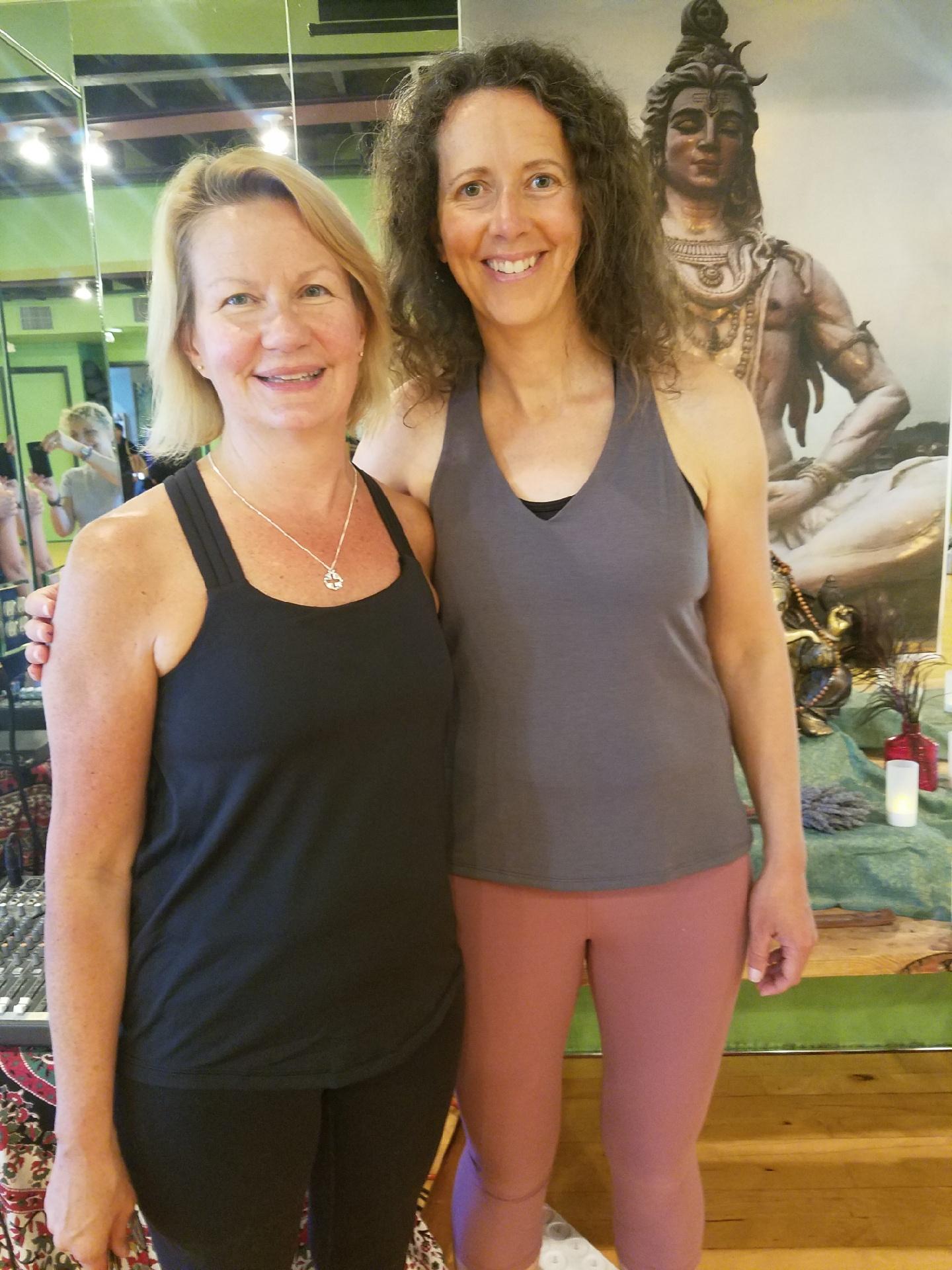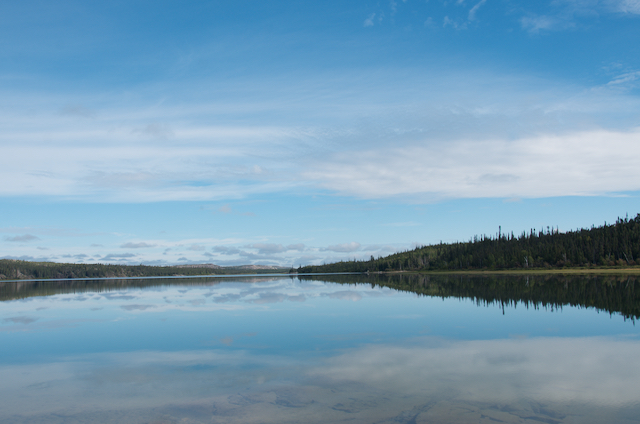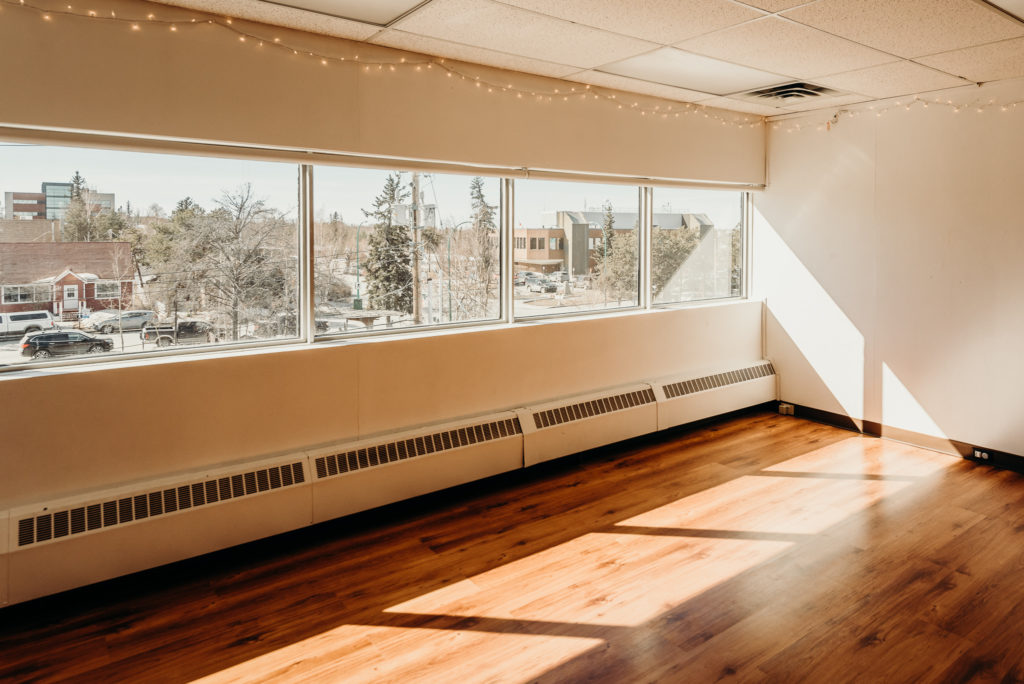I find fall a great time of year for self-reflection. Last week I had the opportunity to study the therapeutic applications of Restorative yoga with Judith Lasater in San Francisco. Judith doesn’t waste words – she has a gift for invoking words for a purpose and in ways that don’t offend and often inspire. I always leave her workshops with nuggets of wisdom to digest and reflect upon.

My friend Robin, a yoga teacher from Maryland,
and I decided to take the workshop together.
This is us at the end of the workshop after 5 days
of Restorative yoga!
This time I was mostly inspired by Judith’s thoughts on silence. Judith is an advocate for teaching yoga without playing music. In Restorative yoga in particular, Judith teaches prospective teachers that to set up the class atmosphere to encourage relaxation there are four important factors she refers to as “still, quiet, dark and warm.” These are all necessary conditions for allowing the nervous system to activate physiological relaxation. With respect to talking or playing music in class Judith says “They are either listening to you (or the music) and therefore not relaxing or tuning you out altogether so why not leave space for quiet?”
To be honest, none of this was new. I have studied with Judith before and had heard all this. But what inspired new reflection was when she said:
“Silence is really important for the function of your brain.”
I’ve written before on the Culture of Busy and the Importance of Relaxation where I discuss how our constant busy-ness and cultural views that equate success and accomplishment with busy might be undermining our health and potentially our personal values. But I’ve never seriously given thought to the impact of noise. Sure, I’ve experienced the rejuvenating power of silence during years of canoe-tripping and time spent in nature. I’m familiar with the term “noise pollution” and I’ve contemplated noise by-laws in our decision-making about whether to keep a rooster. I’m even aware of how too much noise prevents my ability to think clearly – I frequently turn off the music when trying to carry out a conversation with my partner while the kids are playing noisily in the other room and the summer sounds of construction are wafting in through an open window. But Judith’s words inspired me to consider noise – and silence – in a completely new way. “…..important for the function of your brain.”
Noise has become synonymous with the modern world. I invite you to take a moment right now to close your eyes and listen – how many different sounds can you hear that you had been tuning out to focus on the task at hand? Try to discover the sound nearest to you as well as the one that is furthest away. Ambient noise has long been linked with insomnia, increased blood pressure and cardiovascular illness, cognitive impairment in children and increases in the physiological stress response. Ref, Ref
Florence Nightingale, considered the founder of modern nursing, wrote in 1859 in Notes on Nursing:
“Necessary noise is that which damages the patient…..Unnecessary noise is the cruellest absence of care.”
So if noise is detrimental to health, then what about silence?
Definitions of silence commonly describe it by what it isn’t:
“The complete absence of sound” (Oxford dictionary)
“The absence of ambient sound” (Wikipedia)
“Forbearance from speech or noise” “Absence of sound or noise” (Mirriam-Webster)
However, the neuroscience of silence is suggesting that silence can be described much more by what it is than by what it isn’t.

Accidental findings have come from research looking at the effects of sound in which silence has been used as the control group. A 2006 study looking at the stress-modulating effects of different music, found that the most profound physiological relaxation responses occurred during 2-minute pauses in the music. They measured decreases in blood pressure, breathing rate and heart rate during the 2-minute pauses.
Further research on mice in 2015 has shown that a daily 2-hour period of silence stimulates brain growth in the hippocampus, a region of the brain associated with memory, learning and emotions. “…..important for the function of your brain.”
So this is your brain (and your body) on silence: decreased stress hormones, improved sleep, lower blood pressure, benefits to brain chemistry and growth, improved creativity and self-reflection. Hmm. Maybe it is time to consider seeking refuge in silence.
In 2011 the Finnish Tourist Board decided to claim silence as a resource and market it as a Finnish brand. They might be on to something.
This fall I plan to make time in my life for absolute silence. If this sounds interesting to you here are some ideas to help you find silence in your life:
- Go for a walk or a paddle or a ski in nature
- Create the space in your life to sit for a few minutes each day without distraction in complete silence, you could call it meditation or just simply your moment of silence
- Try out my Restorative Yoga classes – I promise to create a refuge where silence is honoured as more than simply the absence of sound
I’d love to hear from you about your ideas on creating space for silence in your life. If you’re reading this after my Restore and Rebalance class is over you can check out my upcoming events to find other classes, workshops and retreats that honour the healing power of silence.


